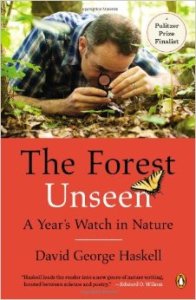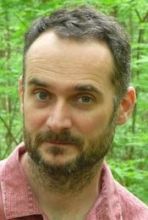Guest // David George Haskell, PhD
Host // Louise Kuo Habakus

It’s no surprise that the forest can teach us biology. But does it also hold lessons about social connections, social responsibility, and our essential humanity?
Yes.
Imagine a contemporary biologist who writes like a poet — giddy with delight about the surprises and secrets that Nature will disclose to anyone who cares to take a closer look.
We know that our kids need to spend more time outdoors. For this to happen, maybe parents need a dose of inspiration, too. This isn’t a quick read; you won’t (and shouldn’t) knock it off your list in a weekend. I’m reading it with my boys, individually. Each is drawn to different ideas — the brutal parasitism of the horsetail worm… stripping naked in -20F weather to experience winter as the chickadees do — but it feeds curiosity and spurs some terrific conversations.
If you’re headed to the lake or mountains — or wish you were — this is the perfect summer read. The chapters are short and the insights are unexpected. It’s no wonder that this book was a finalist for the 2013 Pulitzer Prize and received numerous awards, including the National Academies’ Best Book Award for 2013, the 2013 Reed Environmental Writing Award, and the 2012 National Outdoor Book Award for Natural History Literature. A profile in The New York Times said that Haskell “gives the natural world the kind of open-minded attention one expects from a Zen monk rather than a hypothesis-driven scientist.”


